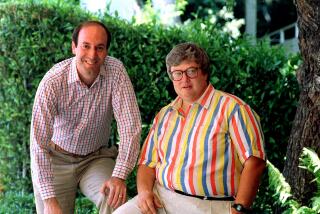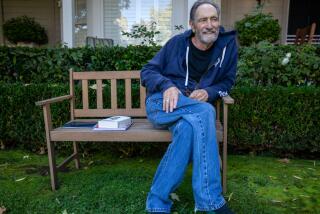Remembrance: Roger Ebert, film’s hero to the end
This post has been corrected. See below for details.
It seems like only yesterday — in fact, it was only yesterday — that I read that Roger Ebert was taking what he called, with typical verbal skill, “a leave of presence” to fight the cancer that had re-invaded his body. Today he is dead, and that collapsed time frame somehow seems only fitting.
For in the more than 10 years since he was diagnosed with cancer, Roger refused to give up as much as an inch to the disease that had ravaged his body but left his mind if anything more nimble and ready to rumble. That overused word, “courageous,” fit him so well that I could only shake my head in wonder at what he was able to do.
FOR THE RECORD:
Roger Ebert: A remembrance of film critic Roger Ebert in the April 5 Calendar section said that Ebert’s father worked for the University of Chicago. He worked for the University of Illinois. —
No matter what physical depredations he faced, including the loss of a section of his jaw, the ability to chew food and even speak, Roger could not be kept away from pursuing film, the great love of his life. Last year, despite his continuing problems, he reviewed 306 films, the most of his career. Even days before he died, he was making plans for future film events because that was the only way he knew how to live.
PHOTOS: Roger Ebert - Career in Pictures
I first got to know Roger when I started going regularly, as he did, to the film festivals at Sundance and Cannes. Though festival-going is more grueling than glamorous, the best part of it is catching up with fellow regulars, people who over time became like members of an extended family. Roger and I frequently found ourselves together because we shared some of the same proclivities, like wanting to sit in the far corner of the very last row at the enormous Eccles Theater in Park City.
More than that, Roger always puckishly claimed I had changed his life for the better when I introduced him to the Timex Indiglo watch, which lights up in the dark and lets you figure out how much time is left in particularly worrisome films. Roger promptly called it “the Critic’s Friend” and often pulled his out when he saw me to prove that he was still keeping the faith.
On a more public level, of course, Roger was the best known film critic in America, the first film critic to win a Pulitzer Prize. I had been aware of his preeminence as one half of the Siskel and Ebert television team long before I ever thought I’d get to know him personally.
Once I did get to know him, walking back from screenings to the Hotel Splendid, the unofficial headquarters of American critics at Cannes, I was struck more than once by how invariably gracious he was to the waves of people that television had introduced him to. It could not always have been easy.
RELATED: Fans, celebs react to Ebert’s death
Shortly after Gene Siskel’s death, for example, Roger told me that a fan had come up to him, stopped short, gave him a hard look and asked “Are you the one who died?” Roger took it all in stride.
The more I got to know Roger, the more I thought that his TV work, though it brought him a measure of fame and fiscal independence, did a real disservice to his deep critical gifts.
The show’s popularizing of the thumbs-up, thumbs-down mode of determining a film’s fate was not a model of sophisticated analysis. Yet Roger himself was a dedicated scholar of film who could talk for hours about the camerawork in “Citizen Kane” or the newest wrinkles in emerging Romanian cinema.
His love for film was so great, his passion for introducing audiences to works so strong, that he wouldn’t allow even losing his voice to slow him down. He wrote notes on pads for informal conversations and used a computerized voice system for more elaborate addresses. The show always had to go on.
PHOTOS: Notable deaths of 2013
Roger was the earliest proponent of the Internet I knew of — and not just among critics. Through his reviews, blog posts and tweets, Roger brought the appreciation of film, and film criticism, into the future and to the widest possible audience. But the story I remember most about him was one he told me about the past.
Interviewing Roger onstage a few years back when he came to Los Angeles to promote one of his books, I asked him to talk about his early life. His father, he said, had been an electrician and handyman at the University of Illinois at Urbana-Champaign. He could fix anything and everything, but he steadfastly refused to teach Roger any of his skills. I asked him why.
“He’d come home at night after spending the day in the offices of these professors, and he’d say to me, almost in awe, ‘Roger, they just sit there and think.’ That’s the life he wanted for me, he didn’t want me fixing things like he did.’”
Roger’s dad got what he wanted, and we all have been the richer for it.
[For the record, April 4, 2013, 7:10 p.m.: A previous version of this post said Ebert’s father worked at the University of Chicago. He worked at the University of Illinois at Urbana-Champaign.]
PHOTOS AND MORE
TIMELINE: Violence in movies
ENVELOPE: The latest awards buzz
PHOTOS: Greatest box office flops
More to Read
Only good movies
Get the Indie Focus newsletter, Mark Olsen's weekly guide to the world of cinema.
You may occasionally receive promotional content from the Los Angeles Times.











